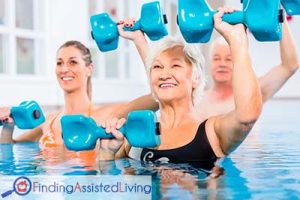 Many things about the brain and the ‘mind’ are poorly understood. Researchers may take decades to untangle some of the mysteries surrounding normal brain function, aging and the development of dementia, Alzheimer’s disease and memory loss. Today, doctors and scientists hedge their statements about brain health with phrases like, “we now think…” or “it seems…” There is one area where this is definitely not the case: the effect of exercise.
Many things about the brain and the ‘mind’ are poorly understood. Researchers may take decades to untangle some of the mysteries surrounding normal brain function, aging and the development of dementia, Alzheimer’s disease and memory loss. Today, doctors and scientists hedge their statements about brain health with phrases like, “we now think…” or “it seems…” There is one area where this is definitely not the case: the effect of exercise.
There is no question that physical exercise is good for the brain! This is true for young people, middle-aged people and especially for seniors. Before we go much further, let’s be sure that we understand the terms, “mind” and “brain.” Exercise helps both, but there is a difference.
The brain is a physical organ like the heart, liver or kidneys. The ‘mind’ is a more intangible concept involving a person’s thoughts, feelings, emotions, imagination and beliefs. You might say that the brain is the house in which the mind, the real person, lives. In this article, we will examine how physical exercise can benefit the senior brain and the senior mind as well. Hopefully, a later article will relate to the benefits that mental exercises (like learning a new language, playing an instrument or working crossword puzzles) can have for the senior body, mind and brain.
The adult human brain weighs only 2 ½ to 3 pounds, but it consumes about 15% of a person’s blood flow. For all people, it is essential that blood flow to the brain be maintained, and seniors are certainly no exception. One of the best ways to maintain that circulation is through exercise. In fact, exercise is the most important controllable thing you can do to maintain senior brain health.
Assisted living facilities, retirement communities, home health care providers and any professional involved in senior care should be aware of this important need. By providing opportunities to exercise, these senior care professionals can help to preserve and even strengthen brain function. Exercise helps seniors’ memory and thinking both directly and indirectly.
Directly, exercise reduces insulin resistance, inflammation, and stimulates the release of chemicals in the brain that affect the health of brain cells. Indirectly, seniors who exercise improve their mood and sleep patterns and reduce anxiety and stress. These problems frequently contribute to cognitive impairment, especially in seniors.
The NIH (the National Institutes of Health) reports that, besides the benefits of maintaining a senior’s strength, balance and proper weight, exercise may also play a role in reducing the risk of Alzheimer’s disease and age-related cognitive decline, the ability to think and reason clearly. Exercise raises the level of a protein in the brain that is important to memory and learning. Research in seniors has demonstrated that exercise stimulates the brain’s ability to maintain old connections and also to make the new ones that are important to the ability to think, plan and reason.
In one year-long study, seniors who spent 40 minutes a day doing moderate exercises, like walking, showed improved function in the area of the brain responsible for remembering the past, imagining the future and just plain daydreaming. These seniors also improved their ability to plan and organize tasks such as cooking a meal. Assisted living facilities and other senior care organizations with memory care programs should especially take note of this exercise benefit.
Just as importantly, exercise helps the senior “mind”, the psychological wellbeing that determines quality of life. The mind is the sum total of a person’s thoughts, feelings attitudes and emotions. The mind determines if a person is cheerful or depressed, optimistic or downbeat, pleasant or disagreeable.
Exercise releases endorphins, hormones that create feelings of happiness, and it can even alleviate symptoms among clinically depressed patients including seniors. In fact, exercise may be as effective as antidepressant drugs without the risk of side effects that can be especially troublesome in senior patients.
Retirement communities, assisted living facilities and even senior daycare facilities should make every effort to encourage seniors to exercise alone or to join in group exercise. The normal aches and pains of aging may produce a declining interest in physical activity, including exercise, but every effort should be made to avoid this!
Exercise is a very important factor in determining one’s quality-of-life. Involvement in a good program can lead to a more positive attitude and general sense of well-being. Professionals in senior care and senior health know that taking an overly cautious approach to exercise will lead to a decline in physical health, mental condition and brain function.
An appropriate exercise program is one of the many things to ask about when you are choosing a senior day care center, an assisted living facility or a senior living or retirement community of any kind. Finding Assisted Living and its web service at FindingAssistedLiving.com exist to help seniors with this kind of challenge. Finding Assisted Living is familiar with the local providers of senior care and assisted living facilities, as well as, home health care and other in-home health care options. We can answer questions like, “What are the best assisted living facilities near me?” When you need trustworthy and unbiased advice about these or any other senior living questions, please call on us.
You can contact FindingAssistedLiving.com by clicking the link or by calling 866-333-2657.

